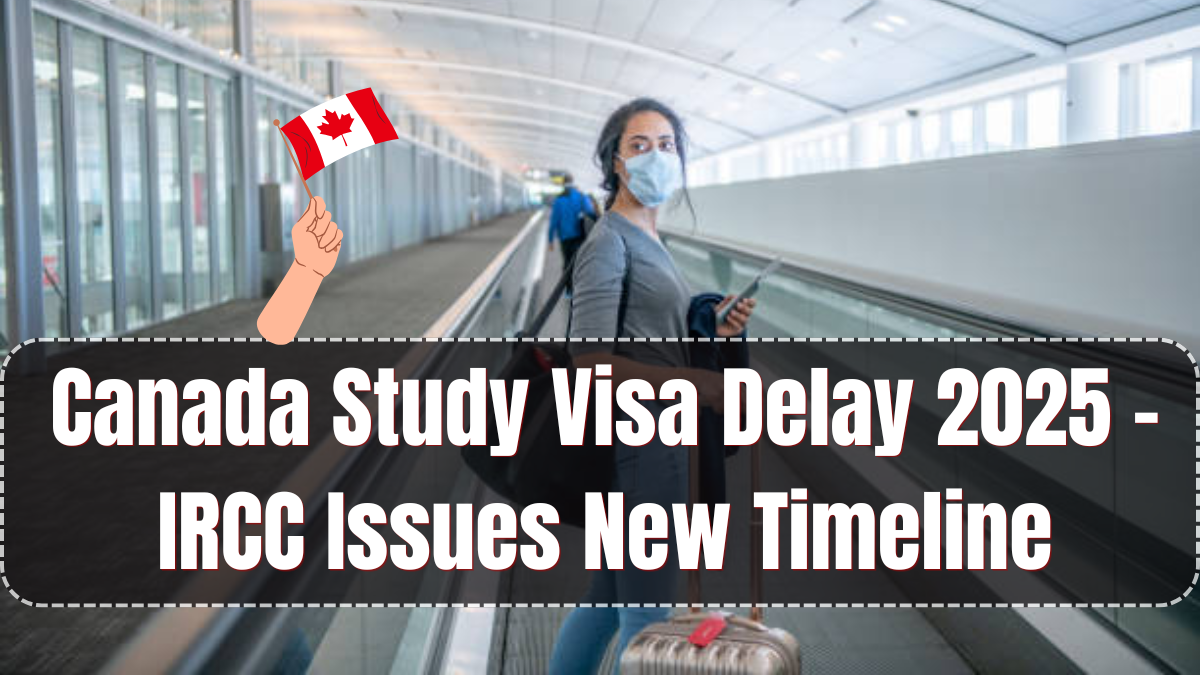International students planning to study in Canada in 2025 are facing unexpected hurdles due to extended delays in study permit processing. The Immigration, Refugees and Citizenship Canada (IRCC) has acknowledged a significant backlog in applications and released a revised timeline for processing Canada study visas.
This delay has created uncertainty among students, especially from countries like India, Nigeria, Pakistan, and the Philippines, who contribute a major share of Canada’s international student population. With fall 2025 academic sessions approaching, both universities and students are seeking clarity on when they can expect visa decisions and travel approvals.

Why Are Canada Study Visas Delayed in 2025?
According to IRCC, the delays are a result of several compounding factors:
1. High Application Volume
IRCC has received over 1.2 million study permit applications between January and June 2025. This is a 28% increase from the same period in 2024, largely driven by Canada’s strong global education reputation and post-study work policies.
2. Staff Shortage and Processing Backlog
While Canada had promised to scale up its visa processing teams, staffing shortages and retirements have affected turnaround time. Some offices are operating with 30% reduced capacity.
3. Updated Eligibility Rules
In early 2025, Canada introduced stricter financial requirements and documentation checks to curb misuse of student permits. This has increased the time spent per application, especially during the review of proof of funds and genuine student intent letters.
4. IT System Migration
IRCC is in the process of migrating to a new digital case management system, which has temporarily slowed down processing across visa categories.
IRCC’s Revised Timeline for 2025 Study Visas
In an official statement issued in July 2025, IRCC outlined the updated timelines for different categories of study permit applicants:
Applications filed before May 15, 2025:
-
Expected decision by August 10, 2025
Applications filed between May 16 and June 30, 2025:
-
Expected decision by August 25, 2025
Applications submitted after July 1, 2025:
-
May be processed after the academic session begins, with priority given to deferred admission requests
IRCC has advised students to not make travel arrangements or pay full tuition until they receive their final visa approval. Institutions have also been asked to be flexible with late arrivals and hybrid participation options.
Impact on Indian and International Students
India, being the largest source of international students to Canada, has seen the biggest impact. Education consultants report that thousands of students who received university admission letters by April are still waiting for their visas.
Many students are now:
-
Requesting universities to defer their admissions to January 2026
-
Opting for online classes until travel approval
-
Exploring alternate destinations like the UK or Australia due to uncertainty
Universities in Ontario, British Columbia, and Alberta have expressed concern about lower international enrollment and are in talks with IRCC to expedite visa decisions for priority programs like STEM, healthcare, and post-grad diplomas.
What Should Students Do Now?
In light of the delays, students planning to study in Canada in Fall 2025 are advised to:
-
Check visa status regularly on the IRCC portal
-
Use the Student Direct Stream (SDS) if eligible, as it offers faster processing for residents of India, China, Philippines, and select other countries
-
Keep university updated with your visa application status
-
Consider deferring admission to Winter 2026 intake if visa is not approved by mid-August
-
Stay cautious of fraud agents claiming to “speed up” your application for money
Students must also ensure their Letter of Acceptance (LOA) and GIC (Guaranteed Investment Certificate) documents are up-to-date, as expired or incomplete records are a major reason for processing holds.
Universities Respond with Flexibility
Recognizing the IRCC delays, many Canadian institutions have rolled out flexible academic policies:
-
Late registration windows extended up to September 30
-
Hybrid classes or online modules for students still abroad
-
Deferment without penalty to January or May 2026 terms
-
Support desks for helping students with documentation, housing, and part-time work planning
Some universities are also working with airlines and consulates to ensure smoother travel plans once visas are issued.
FAQs
What is the average processing time for Canada study visas in 2025?
For SDS applicants: 4–6 weeks
For regular stream applicants: 8–12 weeks
However, delays may extend this timeline by 2–4 weeks in 2025 due to high backlog.
Can I still start classes if my visa is delayed?
Many universities allow students to attend online classes temporarily. However, you cannot enter Canada without a valid study permit.
Should I defer my admission?
If you do not receive a visa by August 20, it is advisable to defer to the Winter 2026 intake to avoid academic loss or travel issues.
Is the SDS stream faster for Indian students?
Yes. SDS applications are prioritized and require fewer supporting documents. Ensure you meet all criteria, including IELTS and GIC requirements.
Will my visa get rejected because of the delay?
No. Delay in processing does not mean rejection. Rejections are based only on eligibility, documentation, or intent—not IRCC’s internal backlog.
Click here to know more.
